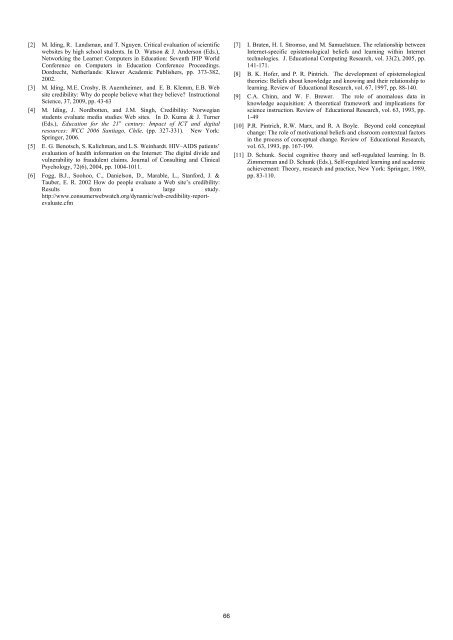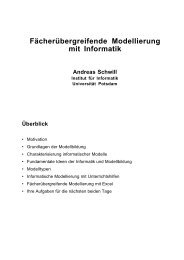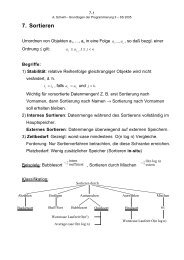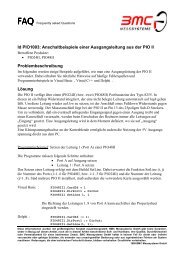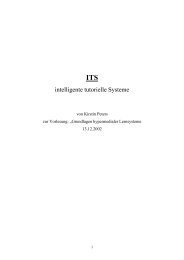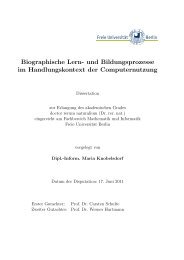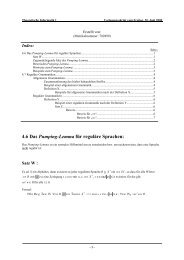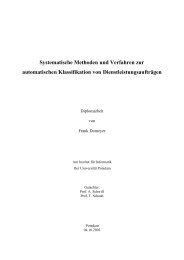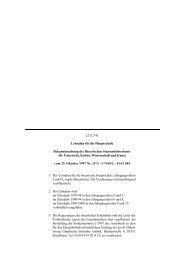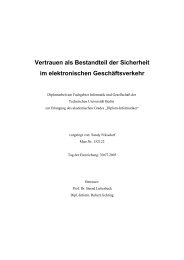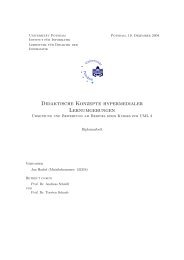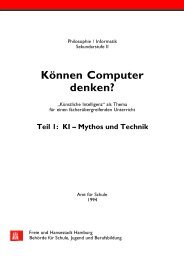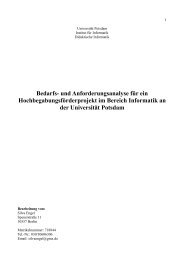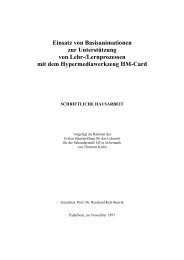Maria Knobelsdorf, University of Dortmund, Germany - Didaktik der ...
Maria Knobelsdorf, University of Dortmund, Germany - Didaktik der ...
Maria Knobelsdorf, University of Dortmund, Germany - Didaktik der ...
You also want an ePaper? Increase the reach of your titles
YUMPU automatically turns print PDFs into web optimized ePapers that Google loves.
[2] M. Iding, R. Landsman, and T. Nguyen. Critical evaluation <strong>of</strong> scientific<br />
websites by high school students. In D. Watson & J. An<strong>der</strong>son (Eds.),<br />
Networking the Learner: Computers in Education: Seventh IFIP World<br />
Conference on Computers in Education Conference Proceedings.<br />
Dordrecht, Netherlands: Kluwer Academic Publishers, pp. 373-382,<br />
2002.<br />
[3] M. Iding, M.E. Crosby, B. Auernheimer, and E. B. Klemm, E.B. Web<br />
site credibility: Why do people believe what they believe? Instructional<br />
Science, 37, 2009, pp. 43-63<br />
[4] M. Iding, J. Nordbotten, and J.M. Singh, Credibility: Norwegian<br />
students evaluate media studies Web sites. In D. Kuma & J. Turner<br />
(Eds.), Education for the 21 st century: Impact <strong>of</strong> ICT and digital<br />
resources: WCC 2006 Santiago, Chile, (pp. 327-331). New York:<br />
Springer, 2006.<br />
[5] E. G. Benotsch, S. Kalichman, and L.S. Weinhardt. HIV–AIDS patients’<br />
evaluation <strong>of</strong> health information on the Internet: The digital divide and<br />
vulnerability to fraudulent claims. Journal <strong>of</strong> Consulting and Clinical<br />
Psychology, 72(6), 2004, pp. 1004-1011.<br />
[6] Fogg, B.J., Soohoo, C., Danielson, D., Marable, L., Stanford, J. &<br />
Tauber, E. R. 2002 How do people evaluate a Web site’s credibility:<br />
Results from a large study.<br />
http://www.consumerwebwatch.org/dynamic/web-credibility-reportevaluate.cfm<br />
66<br />
[7] I. Braten, H. I. Stromso, and M. Samuelstuen. The relationship between<br />
Internet-specific epistemological beliefs and learning within Internet<br />
technologies. J. Educational Computing Research, vol. 33(2), 2005, pp.<br />
141-171.<br />
[8] B. K. H<strong>of</strong>er, and P. R. Pintrich. The development <strong>of</strong> epistemological<br />
theories: Beliefs about knowledge and knowing and their relationship to<br />
learning. Review <strong>of</strong> Educational Research, vol. 67, 1997, pp. 88-140.<br />
[9] C.A. Chinn, and W. F. Brewer. The role <strong>of</strong> anomalous data in<br />
knowledge acquisition: A theoretical framework and implications for<br />
science instruction. Review <strong>of</strong> Educational Research, vol. 63, 1993, pp.<br />
1-49<br />
[10] P.R. Pintrich, R.W. Marx, and R. A Boyle. Beyond cold conceptual<br />
change: The role <strong>of</strong> motivational beliefs and clssroom contextual factors<br />
in the process <strong>of</strong> conceptual change. Review <strong>of</strong> Educational Research,<br />
vol. 63, 1993, pp. 167-199.<br />
[11] D. Schunk. Social cognitive theory and sefl-regulated learning. In B.<br />
Zimmerman and D. Schunk (Eds.), Self-regulated learning and academic<br />
achievement: Theory, research and practice, New York: Springer, 1989,<br />
pp. 83-110.


